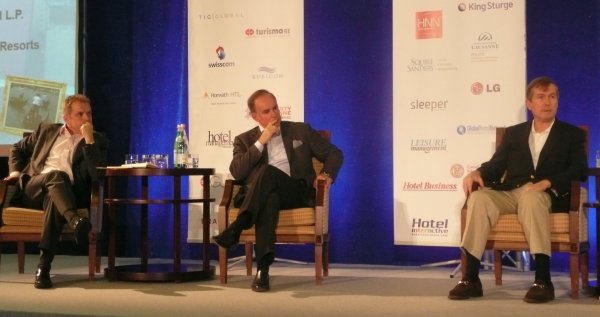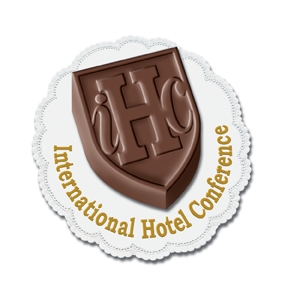Enough capital but no financing - 7th IHC in Venice
 |
|
| The grotesque face of the capital? Venetian masks during the IHC reception at the Hilton Molino Stucky. |
Venice (October 30, 2009). On the market, there is still enough capital and there are many excellent operators, but there are no banks willing to finance. Apparently, they form the "bottleneck" in most European states. At the 7th International Hotel Conference (IHC) in Venice last week, the panel discussions emphasised the key note of the statements made at the Expo Real in Munich before. Moreover, a discussion revealed the growing gap between real hoteliers who are able to do the maths (Moevenpick), and managers that have mutated pure controllers (Hilton). The bankers are only asking for one thing: collateral. According to some financial experts, the loss of value with respect to hotel real estate will continue until the middle of 2010. Until then, there are many bargains on the market. The mixture of the 300 participants of the conference reflected the changed economic situation too: For the first time, the consultants dominated the IHC. Only a couple of bankers and financiers had the courage to come to Venice, renowned chains, such as Starwood Hotels or Rezidor - long-year sponsors - were missing entirely.
The Hilton Molino Stucky was an attentive host; however, the negotiated room rates (starting from 315 euros) were too expensive for many conference participants. Therefore, some of them preferred the wobbly, 20-minute boat ride from St. Mark''s Square. Most of the 4-star rooms located on the main island of Venice were significantly cheaper than on the remote island of Giudecca, where the Hilton is located. This is also a sign of the times.
For the 380 room-Hilton Molino Stucky, opened in June 2007 General Manager Mario Ferraro stated that his hotel started the year 2009 with an excellent performance in Q1 with Mice business growing versus 2008. From Q2 onwards "we have been hit by the decline in demand for events and conferences, but on the other hand, the drop in Mice has been compensated by a strong pick up in transient business growing by 23% in revenue versus last year", he says. Trading conditions in 2009 are particularly challenging for the Venetian hotel industry. According to STR Global, Venice is suffering a negative trend with a double digit year on year % change in RevPar with occupancy decreasing by 2.1% and rates by 12,5%.
Requested: new business models for owners and operators
The waters of the international hotel industry are not calmer than the waves in the Canale Grande. Here, the only consoling fact is: The hotel partners are moving closer together. For true hoteliers such as Jean-Gabriel Pérès, who has manoeuvred Moevenpick Hotels through stormy international seas for ten years now, it is normal to communicate with the investors even more intensely: "We operators even help investors to find co-investors, if they are in financial dire straits," he said. He also encouraged everyone to think about new common business models for investors and operators, to analyse crash management more intently, and to take more time to communicate with each other.
 |
|
| Opening session with Simon Vincent, Jean-Gabriel Pérès and Peter Krause (from left). photos: map |
Moevenpick presented itself as sensitive operator with an open ear for the owners. However, Hilton seemed all the more insensitive: Simon Vincent, President Europe Hilton Worldwide, not only slouched disrespectfully in the conference chair, but also constantly repeated the litany given by of the owner Blackstone to young managers. "We manage our profits and losses; we scan the hotels from the bottom; our strategy is a strategy of growth; we will be measured by our results."
The language of the Moevenpick''s CEO and the Hilton manager at the IHC revealed the growing gap in the industry almost theatrically: Who works in the hotel industry in order to earn money; and who wants to earn money by working in the hotel industry? It is not true that figure-driven chains, such as Hilton, have a better chance with the bankers. Peter C. Krause, boss of the new British Barrow Street Real Estate Fund, has accompanied more than 250 transactions, sold hotel brands and was partner at Morgan Stanley, amongst others. He stated very clearly: The brand of the hotel operator as well as the people behind play a decisive role. For him, the most important fact is the level of the managers, their relations to customers, employees and owners/shareholders.
Private Equity is not dead
Figures and money are not the only things that count; treating the investors'' interests sensitively and their yield expectations are important. "Private equity is not dead!" said Krause; the investors in his new funds would like to invest in the US and Europe, "but it is difficult to obtain outside capital," he had to admit. From an investor’s point of view, there is another handicap, said Pérès: "For our investors from the Middle East, it is difficult to find valuable projects. Krause confirm this: The investors are very careful as long as the room rates continue to fall. The investment expert forecasts that the prices for real estates will maintain their current low level, or might even decrease further until summer 2010. Therefore, the hunts for bargains continue in full force.
 |
|
The issues discussed during the opening panel were also the subject of other individual conversations during the IHC, and they were confirmed at the final discussion: "Occupancy is recovering slowly, but room profit will need a little longer," confirmed Patrick Fitzgibbon, Senior Vice President Development Europe & Africa at Hilton Worldwide. "However, the real estate values will take even longer," said Russell Kett, Managing Director at HVS International London, confirming the statement of investment banker Krause. According to experts, the year 2010 will be another difficult year; however, recovery will start in 2011. In addition, there will be not as many new hotels as in the nineties.
Due to the tense allocation of credits, hotel operators - such as Hilton - see more chances as franchisors. After all, many family businesses were forced to affiliate with large brand systems due to the crisis. The number of conversions will grow significantly. However, Patrick Fitzgibbon did not mention what other full-time franchisors, such as Choice Hotels, openly admit: Weak family businesses - which do not (or no longer) obtain financings - are not welcome among franchisees. Nevertheless, Hilton feels strong: According to Fitzgibbon, the chain is able to make as many deals as never before. / Maria Puetz-Willems
Next issue: additional articles about the International Hotel Conference in Venice and Russia & CIS Hotel Investment Conference, which took place in St. Petersburg this week.
To print this article you have to be registered and logged in for newsletter, visitor or subscription.





